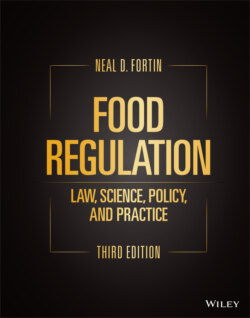Читать книгу Food Regulation - Neal D. Fortin - Страница 232
4.7.9 Statements That Are Not Implied Claims
ОглавлениеA number of specific uses of terms are not considered implied nutrient content claims when it is clear that they are not made in a nutrient context.96
1 A claim that a specific ingredient or food component is absent for food allergies, food intolerance, religious beliefs, or dietary practices such as vegetarianism or other non‐nutrition‐related reason (e.g., “100 percent milk free”).
2 A claim about a substance that is non‐nutritive (e.g., “contains no preservatives,” “no artificial colors”).
3 A claim about the presence of an ingredient that is perceived to add value to the product (e.g., “made with real butter,” “made with whole fruit,” or “contains honey”).
4 A statement of identity for a food in which an ingredient constitutes essentially 100 percent of a food (e.g., “corn oil,” “oat bran,” “dietary supplement of vitamin C 60 mg tablet”).
5 A statement of identity (e.g., “corn oil margarine,” “oat bran muffins,” or “whole wheat bagels”), unless such claim is made in a context that suggests that a nutrient is absent or present in a certain amount.
6 A statement of special dietary usefulness in compliance with 21 C.F.R. part 105.
